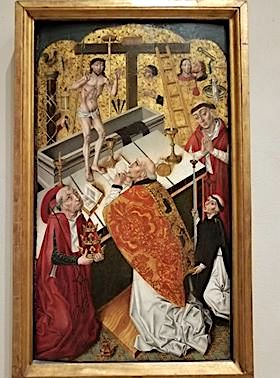Pope Gregory I
Pope Gregory I (c. 540 – 12 March 604), also known as Saint Gregory the Great, was the Pope of the Roman Catholic Church from 3 September 590 until his death in 604. Gregory is well known for his writings, which were more prolific than those of any of his predecessors as pope. He is also considered a Saint in the Catholic Church, the Eastern Orthodox Church, the Anglican Communion, and some Lutheran churches. Immediately after his death, Gregory was canonized by popular acclaim. He is one of the Doctors of the Church and is also known as the patron saint of musicians, singers, students, and teachers.
Early Life[edit | edit source]
Gregory was born in Rome around the year 540 to an aristocratic family with close connections to the church. His father was Gordianus, a wealthy senator who later became a deacon, and his mother was Silvia, who was also canonized as a saint. Gregory received a comprehensive education in both secular and religious studies.
Career Before Papacy[edit | edit source]
Before becoming pope, Gregory served as the Prefect of Rome, the highest civil office in the city, after which he turned to a monastic life. Around 575, he founded six monasteries on his Sicilian estate and one in Rome, the famous Monastery of St. Andrew, where he became a monk. His deep involvement in monasticism shaped his later papal policies and reforms.
Papacy[edit | edit source]
Gregory was elected Pope in 590, during a time of great distress in Rome, which was suffering from famine, plague, and flood. His papacy is noted for its significant administrative, spiritual, and diplomatic achievements. Gregory reformed church administration, improved the welfare of the poor, and enhanced the liturgy with what became known as Gregorian Chant. He also played a pivotal role in the conversion of the Anglo-Saxons to Christianity, sending Saint Augustine of Canterbury and a team of missionaries to England in 597.
Writings and Theology[edit | edit source]
Gregory's theological and pastoral works include the Moralia in Job, a commentary on the Book of Job, and the Pastoral Care (also known as Pastoral Rule), a guide for bishops on how to lead their flocks. His letters, of which 848 have survived, provide valuable insight into the issues facing the church at that time.
Legacy[edit | edit source]
Gregory's impact on the church was profound and lasting. He is remembered for his role in establishing the early medieval papacy as a force for spiritual leadership in the Western world. His contributions to church music, liturgy, and administration set standards that would influence the church for centuries.
Death[edit | edit source]
Gregory died on 12 March 604 and was buried in St. Peter's Basilica. His feast day is celebrated on 3 September in the Catholic Church and on 12 March in the Eastern Orthodox Church.
This Christian leader related article is a stub. You can help WikiMD by expanding it.
Search WikiMD
Ad.Tired of being Overweight? Try W8MD's physician weight loss program.
Semaglutide (Ozempic / Wegovy and Tirzepatide (Mounjaro / Zepbound) available.
Advertise on WikiMD
|
WikiMD's Wellness Encyclopedia |
| Let Food Be Thy Medicine Medicine Thy Food - Hippocrates |
Translate this page: - East Asian
中文,
日本,
한국어,
South Asian
हिन्दी,
தமிழ்,
తెలుగు,
Urdu,
ಕನ್ನಡ,
Southeast Asian
Indonesian,
Vietnamese,
Thai,
မြန်မာဘာသာ,
বাংলা
European
español,
Deutsch,
français,
Greek,
português do Brasil,
polski,
română,
русский,
Nederlands,
norsk,
svenska,
suomi,
Italian
Middle Eastern & African
عربى,
Turkish,
Persian,
Hebrew,
Afrikaans,
isiZulu,
Kiswahili,
Other
Bulgarian,
Hungarian,
Czech,
Swedish,
മലയാളം,
मराठी,
ਪੰਜਾਬੀ,
ગુજરાતી,
Portuguese,
Ukrainian
Medical Disclaimer: WikiMD is not a substitute for professional medical advice. The information on WikiMD is provided as an information resource only, may be incorrect, outdated or misleading, and is not to be used or relied on for any diagnostic or treatment purposes. Please consult your health care provider before making any healthcare decisions or for guidance about a specific medical condition. WikiMD expressly disclaims responsibility, and shall have no liability, for any damages, loss, injury, or liability whatsoever suffered as a result of your reliance on the information contained in this site. By visiting this site you agree to the foregoing terms and conditions, which may from time to time be changed or supplemented by WikiMD. If you do not agree to the foregoing terms and conditions, you should not enter or use this site. See full disclaimer.
Credits:Most images are courtesy of Wikimedia commons, and templates, categories Wikipedia, licensed under CC BY SA or similar.
Contributors: Prab R. Tumpati, MD





